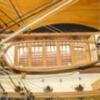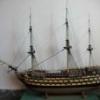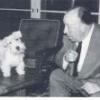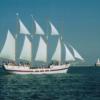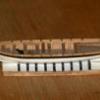Supplies of the Ship Modeler's Handbook are running out. Get your copy NOW before they are gone! Click on photo to order.
×
-
Posts
4,562 -
Joined
-
Last visited
Reputation Activity
-
 Blue Ensign got a reaction from davec in 18th Century English Longboat by Blue Ensign - FINISHED - Model Shipways - 1:48 Scale
Blue Ensign got a reaction from davec in 18th Century English Longboat by Blue Ensign - FINISHED - Model Shipways - 1:48 Scale
Many thanks to Al, Nils, Derek, and Mike for your interest and comments.
Mast and spars.
I have not gone into further research regarding the mast dimensions, I will fine tune it by eye.
I divided the length from the thwart to the shoulder into quarters for the purpose of taper. From the plan 4mm at thwart, 3.6mm (1stQ) 3.5mm (2ndQ) 3.1mm (3rd Q) 2.5mm (Shoulder)
From the shoulder to mast cap; 2.2mm 2mm at centre, 1.8mm at truck.
A card gauge is used to monitor progress at the Quarters.
2236
The tapering was done on the Proxxon wood lathe.
Making of the Bowsprit, Gaff and Boom are fairly straightforward.
2237
The Gaff jaws were fashioned from some Boxwood sheet, and it should be noted that the Boom is tapered each end from the centre where it thickens slightly.
Boom Iron
Always seeking the easy route I initially followed the kit instruction for making this; c.a. the ends and twist the extension to the horizontal before drilling the hole for the Boom Gooseneck.
2238
This didn't work for me the c.a. failed to hold following the twist, so I reverted to silver soldering which achieved the objective.
2241
2246
2250
Trial fitting of the Boom iron.
The mast dowel takes some distress during the iron fitting process. Would have been better to use Boxwood for the spars I think.
2254
The completed iron set.
Mast colouring.
The problem with using the provided dowel is that getting a good finish using just varnish is tricky. Patchiness, uneven coverage, and strange over-scale grain patterns show thro'.
I found that sealing the dowel with matt varnish was necessary to seal the surface before applying my tinted varnish mix.
Several coats later with light in-between fine paper rub downs and I get the look I'm after.
So here's the completed masting set.
4297
The varnished parts were of a satin finish, and to complete they were coated with matt varnish.
B.E.
-
 Blue Ensign got a reaction from Derek C in 18th Century English Longboat by Blue Ensign - FINISHED - Model Shipways - 1:48 Scale
Blue Ensign got a reaction from Derek C in 18th Century English Longboat by Blue Ensign - FINISHED - Model Shipways - 1:48 Scale
Many thanks to Al, Nils, Derek, and Mike for your interest and comments.
Mast and spars.
I have not gone into further research regarding the mast dimensions, I will fine tune it by eye.
I divided the length from the thwart to the shoulder into quarters for the purpose of taper. From the plan 4mm at thwart, 3.6mm (1stQ) 3.5mm (2ndQ) 3.1mm (3rd Q) 2.5mm (Shoulder)
From the shoulder to mast cap; 2.2mm 2mm at centre, 1.8mm at truck.
A card gauge is used to monitor progress at the Quarters.
2236
The tapering was done on the Proxxon wood lathe.
Making of the Bowsprit, Gaff and Boom are fairly straightforward.
2237
The Gaff jaws were fashioned from some Boxwood sheet, and it should be noted that the Boom is tapered each end from the centre where it thickens slightly.
Boom Iron
Always seeking the easy route I initially followed the kit instruction for making this; c.a. the ends and twist the extension to the horizontal before drilling the hole for the Boom Gooseneck.
2238
This didn't work for me the c.a. failed to hold following the twist, so I reverted to silver soldering which achieved the objective.
2241
2246
2250
Trial fitting of the Boom iron.
The mast dowel takes some distress during the iron fitting process. Would have been better to use Boxwood for the spars I think.
2254
The completed iron set.
Mast colouring.
The problem with using the provided dowel is that getting a good finish using just varnish is tricky. Patchiness, uneven coverage, and strange over-scale grain patterns show thro'.
I found that sealing the dowel with matt varnish was necessary to seal the surface before applying my tinted varnish mix.
Several coats later with light in-between fine paper rub downs and I get the look I'm after.
So here's the completed masting set.
4297
The varnished parts were of a satin finish, and to complete they were coated with matt varnish.
B.E.
-
 Blue Ensign got a reaction from marktiedens in 18th Century English Longboat by Blue Ensign - FINISHED - Model Shipways - 1:48 Scale
Blue Ensign got a reaction from marktiedens in 18th Century English Longboat by Blue Ensign - FINISHED - Model Shipways - 1:48 Scale
Many thanks to Al, Nils, Derek, and Mike for your interest and comments.
Mast and spars.
I have not gone into further research regarding the mast dimensions, I will fine tune it by eye.
I divided the length from the thwart to the shoulder into quarters for the purpose of taper. From the plan 4mm at thwart, 3.6mm (1stQ) 3.5mm (2ndQ) 3.1mm (3rd Q) 2.5mm (Shoulder)
From the shoulder to mast cap; 2.2mm 2mm at centre, 1.8mm at truck.
A card gauge is used to monitor progress at the Quarters.
2236
The tapering was done on the Proxxon wood lathe.
Making of the Bowsprit, Gaff and Boom are fairly straightforward.
2237
The Gaff jaws were fashioned from some Boxwood sheet, and it should be noted that the Boom is tapered each end from the centre where it thickens slightly.
Boom Iron
Always seeking the easy route I initially followed the kit instruction for making this; c.a. the ends and twist the extension to the horizontal before drilling the hole for the Boom Gooseneck.
2238
This didn't work for me the c.a. failed to hold following the twist, so I reverted to silver soldering which achieved the objective.
2241
2246
2250
Trial fitting of the Boom iron.
The mast dowel takes some distress during the iron fitting process. Would have been better to use Boxwood for the spars I think.
2254
The completed iron set.
Mast colouring.
The problem with using the provided dowel is that getting a good finish using just varnish is tricky. Patchiness, uneven coverage, and strange over-scale grain patterns show thro'.
I found that sealing the dowel with matt varnish was necessary to seal the surface before applying my tinted varnish mix.
Several coats later with light in-between fine paper rub downs and I get the look I'm after.
So here's the completed masting set.
4297
The varnished parts were of a satin finish, and to complete they were coated with matt varnish.
B.E.
-
 Blue Ensign got a reaction from gjdale in 18th Century English Longboat by Blue Ensign - FINISHED - Model Shipways - 1:48 Scale
Blue Ensign got a reaction from gjdale in 18th Century English Longboat by Blue Ensign - FINISHED - Model Shipways - 1:48 Scale
Many thanks to Al, Nils, Derek, and Mike for your interest and comments.
Mast and spars.
I have not gone into further research regarding the mast dimensions, I will fine tune it by eye.
I divided the length from the thwart to the shoulder into quarters for the purpose of taper. From the plan 4mm at thwart, 3.6mm (1stQ) 3.5mm (2ndQ) 3.1mm (3rd Q) 2.5mm (Shoulder)
From the shoulder to mast cap; 2.2mm 2mm at centre, 1.8mm at truck.
A card gauge is used to monitor progress at the Quarters.
2236
The tapering was done on the Proxxon wood lathe.
Making of the Bowsprit, Gaff and Boom are fairly straightforward.
2237
The Gaff jaws were fashioned from some Boxwood sheet, and it should be noted that the Boom is tapered each end from the centre where it thickens slightly.
Boom Iron
Always seeking the easy route I initially followed the kit instruction for making this; c.a. the ends and twist the extension to the horizontal before drilling the hole for the Boom Gooseneck.
2238
This didn't work for me the c.a. failed to hold following the twist, so I reverted to silver soldering which achieved the objective.
2241
2246
2250
Trial fitting of the Boom iron.
The mast dowel takes some distress during the iron fitting process. Would have been better to use Boxwood for the spars I think.
2254
The completed iron set.
Mast colouring.
The problem with using the provided dowel is that getting a good finish using just varnish is tricky. Patchiness, uneven coverage, and strange over-scale grain patterns show thro'.
I found that sealing the dowel with matt varnish was necessary to seal the surface before applying my tinted varnish mix.
Several coats later with light in-between fine paper rub downs and I get the look I'm after.
So here's the completed masting set.
4297
The varnished parts were of a satin finish, and to complete they were coated with matt varnish.
B.E.
-
 Blue Ensign got a reaction from CaptainSteve in 18th Century English Longboat by Blue Ensign - FINISHED - Model Shipways - 1:48 Scale
Blue Ensign got a reaction from CaptainSteve in 18th Century English Longboat by Blue Ensign - FINISHED - Model Shipways - 1:48 Scale
Many thanks to Al, Nils, Derek, and Mike for your interest and comments.
Mast and spars.
I have not gone into further research regarding the mast dimensions, I will fine tune it by eye.
I divided the length from the thwart to the shoulder into quarters for the purpose of taper. From the plan 4mm at thwart, 3.6mm (1stQ) 3.5mm (2ndQ) 3.1mm (3rd Q) 2.5mm (Shoulder)
From the shoulder to mast cap; 2.2mm 2mm at centre, 1.8mm at truck.
A card gauge is used to monitor progress at the Quarters.
2236
The tapering was done on the Proxxon wood lathe.
Making of the Bowsprit, Gaff and Boom are fairly straightforward.
2237
The Gaff jaws were fashioned from some Boxwood sheet, and it should be noted that the Boom is tapered each end from the centre where it thickens slightly.
Boom Iron
Always seeking the easy route I initially followed the kit instruction for making this; c.a. the ends and twist the extension to the horizontal before drilling the hole for the Boom Gooseneck.
2238
This didn't work for me the c.a. failed to hold following the twist, so I reverted to silver soldering which achieved the objective.
2241
2246
2250
Trial fitting of the Boom iron.
The mast dowel takes some distress during the iron fitting process. Would have been better to use Boxwood for the spars I think.
2254
The completed iron set.
Mast colouring.
The problem with using the provided dowel is that getting a good finish using just varnish is tricky. Patchiness, uneven coverage, and strange over-scale grain patterns show thro'.
I found that sealing the dowel with matt varnish was necessary to seal the surface before applying my tinted varnish mix.
Several coats later with light in-between fine paper rub downs and I get the look I'm after.
So here's the completed masting set.
4297
The varnished parts were of a satin finish, and to complete they were coated with matt varnish.
B.E.
-
 Blue Ensign got a reaction from Martin W in 18th Century English Longboat by Blue Ensign - FINISHED - Model Shipways - 1:48 Scale
Blue Ensign got a reaction from Martin W in 18th Century English Longboat by Blue Ensign - FINISHED - Model Shipways - 1:48 Scale
Many thanks to Al, Nils, Derek, and Mike for your interest and comments.
Mast and spars.
I have not gone into further research regarding the mast dimensions, I will fine tune it by eye.
I divided the length from the thwart to the shoulder into quarters for the purpose of taper. From the plan 4mm at thwart, 3.6mm (1stQ) 3.5mm (2ndQ) 3.1mm (3rd Q) 2.5mm (Shoulder)
From the shoulder to mast cap; 2.2mm 2mm at centre, 1.8mm at truck.
A card gauge is used to monitor progress at the Quarters.
2236
The tapering was done on the Proxxon wood lathe.
Making of the Bowsprit, Gaff and Boom are fairly straightforward.
2237
The Gaff jaws were fashioned from some Boxwood sheet, and it should be noted that the Boom is tapered each end from the centre where it thickens slightly.
Boom Iron
Always seeking the easy route I initially followed the kit instruction for making this; c.a. the ends and twist the extension to the horizontal before drilling the hole for the Boom Gooseneck.
2238
This didn't work for me the c.a. failed to hold following the twist, so I reverted to silver soldering which achieved the objective.
2241
2246
2250
Trial fitting of the Boom iron.
The mast dowel takes some distress during the iron fitting process. Would have been better to use Boxwood for the spars I think.
2254
The completed iron set.
Mast colouring.
The problem with using the provided dowel is that getting a good finish using just varnish is tricky. Patchiness, uneven coverage, and strange over-scale grain patterns show thro'.
I found that sealing the dowel with matt varnish was necessary to seal the surface before applying my tinted varnish mix.
Several coats later with light in-between fine paper rub downs and I get the look I'm after.
So here's the completed masting set.
4297
The varnished parts were of a satin finish, and to complete they were coated with matt varnish.
B.E.
-
 Blue Ensign reacted to md1400cs in 18th Century English Longboat by Blue Ensign - FINISHED - Model Shipways - 1:48 Scale
Blue Ensign reacted to md1400cs in 18th Century English Longboat by Blue Ensign - FINISHED - Model Shipways - 1:48 Scale
B.E.,
Apologies - I have mostly (are double adverbs ok in your neck of the woods? haha) silently followed this one - I owe you at least 30+ Like clicks and comments.
As Nils just said - Yes a little gem indeed
Regards,
-
 Blue Ensign reacted to Derek C in 18th Century English Longboat by Blue Ensign - FINISHED - Model Shipways - 1:48 Scale
Blue Ensign reacted to Derek C in 18th Century English Longboat by Blue Ensign - FINISHED - Model Shipways - 1:48 Scale
Yea she is a beautiful boat
-
 Blue Ensign reacted to Mirabell61 in 18th Century English Longboat by Blue Ensign - FINISHED - Model Shipways - 1:48 Scale
Blue Ensign reacted to Mirabell61 in 18th Century English Longboat by Blue Ensign - FINISHED - Model Shipways - 1:48 Scale
Congrats B.E.
to your new little gem. A wonderful model.....
Nils
-
 Blue Ensign reacted to alde in 18th Century English Longboat by Blue Ensign - FINISHED - Model Shipways - 1:48 Scale
Blue Ensign reacted to alde in 18th Century English Longboat by Blue Ensign - FINISHED - Model Shipways - 1:48 Scale
She looks darn nice my friend.
-
 Blue Ensign got a reaction from Elijah in Trabakul by donrobinson - FINISHED - MarisStella - 1:32 scale
Blue Ensign got a reaction from Elijah in Trabakul by donrobinson - FINISHED - MarisStella - 1:32 scale
Love this model Don, and your work on it. Those sails look excellent to me.
B.E.
-
 Blue Ensign got a reaction from CaptainSteve in Ship paintings
Blue Ensign got a reaction from CaptainSteve in Ship paintings
I like your stuff Jim, you certainly have a talent for marine art, one of the more difficult genres I think.
Well done, and long may you enjoy your art.
B.E.
-
 Blue Ensign got a reaction from John Allen in 18th Century English Longboat by Blue Ensign - FINISHED - Model Shipways - 1:48 Scale
Blue Ensign got a reaction from John Allen in 18th Century English Longboat by Blue Ensign - FINISHED - Model Shipways - 1:48 Scale
Thank you Michael and Don.
@ Don - I just sourced the inkjet film on Amazon and picked a five sheet A4 sized film. I only used it for the rudder decoration but it worked out just fine.
B.E.
-
 Blue Ensign got a reaction from davec in 18th Century English Longboat by Blue Ensign - FINISHED - Model Shipways - 1:48 Scale
Blue Ensign got a reaction from davec in 18th Century English Longboat by Blue Ensign - FINISHED - Model Shipways - 1:48 Scale
An inboard fitting and fiddlin' session.
To finish off the rudder I added the decorative panels. I had been waiting to get some Clear Self Adhesive Inkjet Sticker Label Film to print these out.
2084
2085
At only 70 microns thick it shows no edge profile and gives a good impression of a painted on design.
0429
The lifting ring bolts are put into place and the mast support 'iron work' fabricated.
0453
I have now made a set of six oars and the Windlass Bars, and this basically completes the boat as fitted for rowing.
Regarding the Windlass Bars there doesn't seem to be any reference to the scale length of these items either on the plan or in the instruction book.
Had difficulty finding any reference to bar length but I guess around five feet to provide satisfactory leverage.
Finally the Thole pins were added; I deviated from the kit arrangement by setting the boat up for double banked rowing which I think was the norm for Long-boats.
0434
0456
0475
02231
02228
0439
This has only been a seven week build to date altho' it feels much longer.
I now move onto the masting and rigging of this fine, if not at times troublesome little kit.
B.E.
-
 Blue Ensign got a reaction from Martin W in 18th Century English Longboat by Blue Ensign - FINISHED - Model Shipways - 1:48 Scale
Blue Ensign got a reaction from Martin W in 18th Century English Longboat by Blue Ensign - FINISHED - Model Shipways - 1:48 Scale
Thanks mobbsie, I finally got over my indecision and opted for the red stern sheets, but plain thwarts. The oars will be painted red overall, and I felt it better to have a contrast across the thwarts.
I'm warming to this little boat the more I get into the detail, and previous niggles fade into the background.
B.E.
-
 Blue Ensign got a reaction from Old Collingwood in HMS Fly by Dfell - FINISHED - Amati / Victory Models - Scale 1:64
Blue Ensign got a reaction from Old Collingwood in HMS Fly by Dfell - FINISHED - Amati / Victory Models - Scale 1:64
Looking very smart Doug, nice progress.
B.E.
-
 Blue Ensign got a reaction from Old Collingwood in HMS Fly by Dfell - FINISHED - Amati / Victory Models - Scale 1:64
Blue Ensign got a reaction from Old Collingwood in HMS Fly by Dfell - FINISHED - Amati / Victory Models - Scale 1:64
Nice shots Doug, you must be feeling well satisfied with her.
B.E.
-
 Blue Ensign got a reaction from Old Collingwood in HMS Fly by Dfell - FINISHED - Amati / Victory Models - Scale 1:64
Blue Ensign got a reaction from Old Collingwood in HMS Fly by Dfell - FINISHED - Amati / Victory Models - Scale 1:64
Nice job on those swivel mounts Doug, she's shaping up very nicely indeed.
B.E.
-
 Blue Ensign got a reaction from Old Collingwood in HMS Fly by Dfell - FINISHED - Amati / Victory Models - Scale 1:64
Blue Ensign got a reaction from Old Collingwood in HMS Fly by Dfell - FINISHED - Amati / Victory Models - Scale 1:64
Looking good Doug, colour scheme works very well. These Swans surely do make attractive models.
B.E.
-
 Blue Ensign got a reaction from billocrates in HMS Fly by Dfell - FINISHED - Amati / Victory Models - Scale 1:64
Blue Ensign got a reaction from billocrates in HMS Fly by Dfell - FINISHED - Amati / Victory Models - Scale 1:64
Nice work on the headworks Doug 😊
It's always puzzled me why Amati left that strange void between the Main head rails, looks so much better with a little framing as your photo's show.
B.E.
-
 Blue Ensign got a reaction from Old Collingwood in HMS Fly by Dfell - FINISHED - Amati / Victory Models - Scale 1:64
Blue Ensign got a reaction from Old Collingwood in HMS Fly by Dfell - FINISHED - Amati / Victory Models - Scale 1:64
Doug, my Stove is positioned wth the chimey forward, it is the only way it would fit.
I pondered over this for some time but came across a reference to stoves sometimes facing that way.
I did notch out the beam to allow for the steam grating to sit without the beam blocking it from beneath.
I did quite a lot of modifications beneath the Foc'sle deck one of which was to provide sockets on the underside of the deck to take the legs of the Foc'sle bitts. This meant that the legs didn't extend down to the upper deck and would not therefore block your stove whichever way you positioned it.
Possible solutions😊
B.E.
-
 Blue Ensign got a reaction from Old Collingwood in HMS Fly by Dfell - FINISHED - Amati / Victory Models - Scale 1:64
Blue Ensign got a reaction from Old Collingwood in HMS Fly by Dfell - FINISHED - Amati / Victory Models - Scale 1:64
Nice progress Doug, the Syren guns are a big improvement over the generic Amati ones, and they look to be well positioned within the gunports.
B.E.
-
 Blue Ensign got a reaction from Old Collingwood in HMS Fly by Dfell - FINISHED - Amati / Victory Models - Scale 1:64
Blue Ensign got a reaction from Old Collingwood in HMS Fly by Dfell - FINISHED - Amati / Victory Models - Scale 1:64
Looking very smart Doug, nice contrasting colours on the hull, walnut looks great against the white hull and blue of the topsides.
B.E.
-
 Blue Ensign got a reaction from Old Collingwood in HMS Fly by Dfell - FINISHED - Amati / Victory Models - Scale 1:64
Blue Ensign got a reaction from Old Collingwood in HMS Fly by Dfell - FINISHED - Amati / Victory Models - Scale 1:64
Making good progress Doug, hull looks in excellent shape for the second planking.
B.E.
-
 Blue Ensign got a reaction from Old Collingwood in HMS Fly by Dfell - FINISHED - Amati / Victory Models - Scale 1:64
Blue Ensign got a reaction from Old Collingwood in HMS Fly by Dfell - FINISHED - Amati / Victory Models - Scale 1:64
Nice progress Doug, your deck planking looks excellent to my eye; I think we swan builders have all breathed a sigh of relief once the gunport strips have been fixed and we find that the guns sit squarely in the ports allowing a degree of both elevation and depression.
Where the strips join I took the precaution of adding a thin reinforcing strip behind the join for added security.
B.E.


